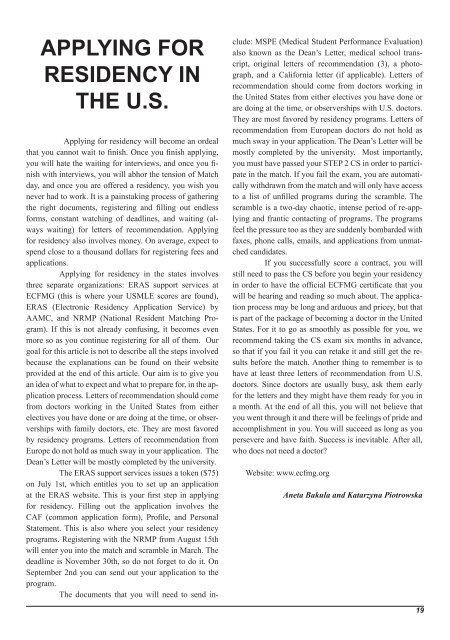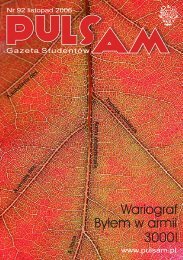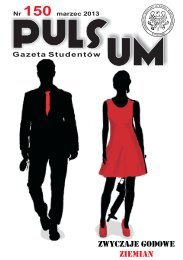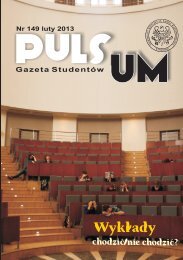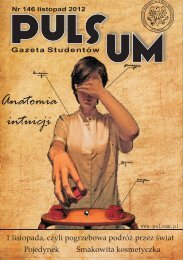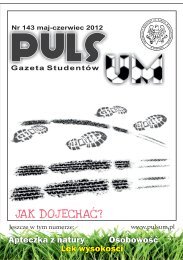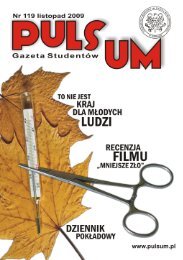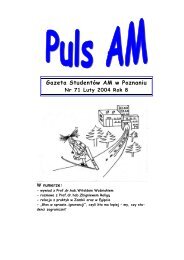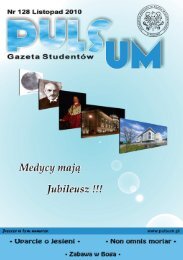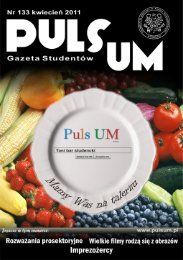Puls UM
Puls UM
Puls UM
Create successful ePaper yourself
Turn your PDF publications into a flip-book with our unique Google optimized e-Paper software.
APPLYING FOR<br />
RESIDENCY IN<br />
THE U.S.<br />
Applying for residency will become an ordeal<br />
that you cannot wait to finish. Once you finish applying,<br />
you will hate the waiting for interviews, and once you finish<br />
with interviews, you will abhor the tension of Match<br />
day, and once you are offered a residency, you wish you<br />
never had to work. It is a painstaking process of gathering<br />
the right documents, registering and filling out endless<br />
forms, constant watching of deadlines, and waiting (always<br />
waiting) for letters of recommendation. Applying<br />
for residency also involves money. On average, expect to<br />
spend close to a thousand dollars for registering fees and<br />
applications.<br />
Applying for residency in the states involves<br />
three separate organizations: ERAS support services at<br />
ECFMG (this is where your USMLE scores are found),<br />
ERAS (Electronic Residency Application Service) by<br />
AAMC, and NRMP (National Resident Matching Program).<br />
If this is not already confusing, it becomes even<br />
more so as you continue registering for all of them. Our<br />
goal for this article is not to describe all the steps involved<br />
because the explanations can be found on their website<br />
provided at the end of this article. Our aim is to give you<br />
an idea of what to expect and what to prepare for, in the application<br />
process. Letters of recommendation should come<br />
from doctors working in the United States from either<br />
electives you have done or are doing at the time, or observerships<br />
with family doctors, etc. They are most favored<br />
by residency programs. Letters of recommendation from<br />
Europe do not hold as much sway in your application. The<br />
Dean’s Letter will be mostly completed by the university.<br />
The ERAS support services issues a token ($75)<br />
on July 1st, which entitles you to set up an application<br />
at the ERAS website. This is your first step in applying<br />
for residency. Filling out the application involves the<br />
CAF (common application form), Profile, and Personal<br />
Statement. This is also where you select your residency<br />
programs. Registering with the NRMP from August 15th<br />
will enter you into the match and scramble in March. The<br />
deadline is November 30th, so do not forget to do it. On<br />
September 2nd you can send out your application to the<br />
program.<br />
The documents that you will need to send include:<br />
MSPE (Medical Student Performance Evaluation)<br />
also known as the Dean’s Letter, medical school transcript,<br />
original letters of recommendation (3), a photograph,<br />
and a California letter (if applicable). Letters of<br />
recommendation should come from doctors working in<br />
the United States from either electives you have done or<br />
are doing at the time, or observerships with U.S. doctors.<br />
They are most favored by residency programs. Letters of<br />
recommendation from European doctors do not hold as<br />
much sway in your application. The Dean’s Letter will be<br />
mostly completed by the university. Most importantly,<br />
you must have passed your STEP 2 CS in order to participate<br />
in the match. If you fail the exam, you are automatically<br />
withdrawn from the match and will only have access<br />
to a list of unfilled programs during the scramble. The<br />
scramble is a two-day chaotic, intense period of re-applying<br />
and frantic contacting of programs. The programs<br />
feel the pressure too as they are suddenly bombarded with<br />
faxes, phone calls, emails, and applications from unmatched<br />
candidates.<br />
If you successfully score a contract, you will<br />
still need to pass the CS before you begin your residency<br />
in order to have the official ECFMG certificate that you<br />
will be hearing and reading so much about. The application<br />
process may be long and arduous and pricey, but that<br />
is part of the package of becoming a doctor in the United<br />
States. For it to go as smoothly as possible for you, we<br />
recommend taking the CS exam six months in advance,<br />
so that if you fail it you can retake it and still get the results<br />
before the match. Another thing to remember is to<br />
have at least three letters of recommendation from U.S.<br />
doctors. Since doctors are usually busy, ask them early<br />
for the letters and they might have them ready for you in<br />
a month. At the end of all this, you will not believe that<br />
you went through it and there will be feelings of pride and<br />
accomplishment in you. You will succeed as long as you<br />
persevere and have faith. Success is inevitable. After all,<br />
who does not need a doctor?<br />
Website: www.ecfmg.org<br />
Aneta Bakula and Katarzyna Piotrowska<br />
19


